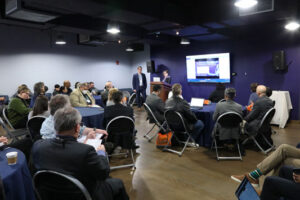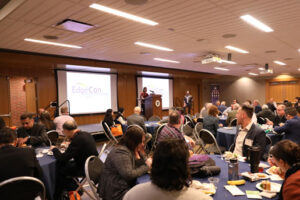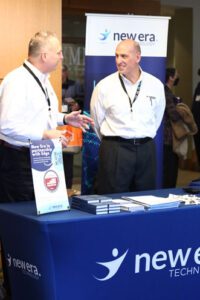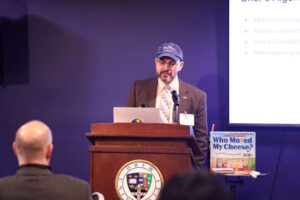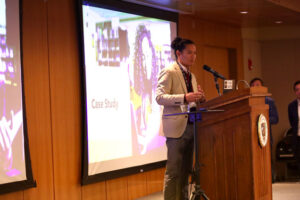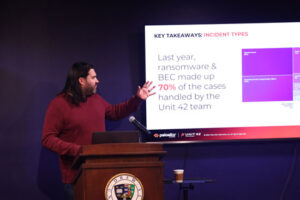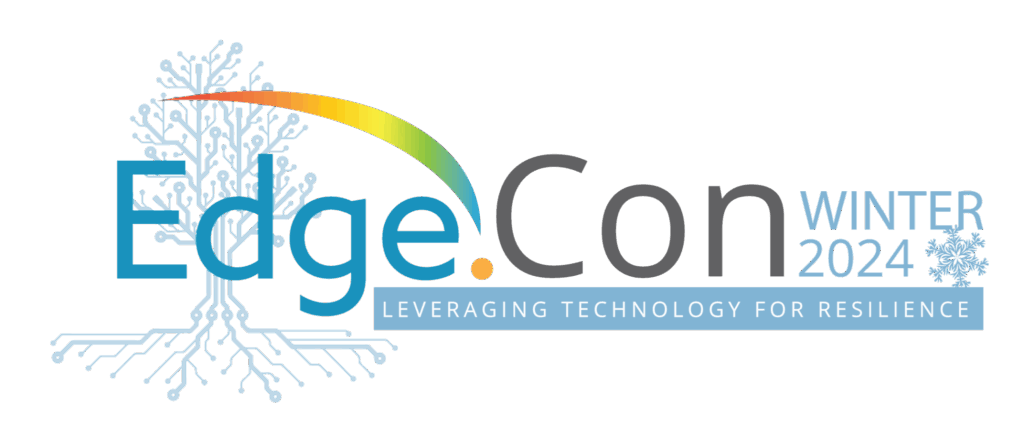
A Sold Out Success
On February 8, nearly 250 attendees representing over 82 institutions and organizations came together for EdgeCon Winter 2024. Hosted by Drew University, the sold out event welcomed technology and educational thought leaders from across the nation to discuss Leveraging Technology for Resilience. Featuring over ten breakout sessions and a lively panel discussion, attendees learned new methods to adapt, grow, and transform technology on their respective campuses.
Leveraging Online Education and Technology
Following a morning of networking and exhibitor connections, breakout sessions kicked off with Leveraging Online Education and Technology to Overcome Enrollment Declines. Presented by Dr. Clayton Steen, Penn State World Campus, Associate Vice President for Enrollment Management and Online Education Strategy, this session focused on identifying and addressing obstacles to the current enrollment crisis and the changing perspectives of online education. Steen explored the current climate of higher ed enrollment, the data around current trends, and strategies for helping offset slowing enrollment.
Post-Quantum Cryptography
To help attendees gain a deeper understanding of the impacts of quantum computers on Information Security, Brian Epstein, Chief Information Security Officer, Institute for Advanced Study, led the session, Who Moved My Rock? Post-Quantum Cryptography and its Impact on Higher Education. The presentation explored the history of Post-Quantum Cryptography, where we are now, and what next steps should be. Epstein discussed taking a rational approach to current risks and how to implement Quantum-Safe Cryptography.
Improving the Student Experience
Many institutions are facing the same challenge: finding ways to improve student retention and success through their programs, engagement strategies, and the use of technology. However, these systems and strategies can be labor-intensive for faculty and staff. Slalom’s Amey Potnis, Delivery Director, Data & Analytics; Randy Tan, US Sales Leader, Public & Social Impact; and Dan Kang, Senior Principal, Cloud Data Architecture, shared a data-enabled, listening-driven approach to addressing current challenges in higher education and supporting students into the future. By leveraging the voice of their students, institutions can reveal key insights into creating engaging experiences and improving student success.

Beyond ChatGPT
Joining EdgeCon from Hudson County Community College (HCCC), Patricia Clay, Associate Vice President and Chief Information Officer, and Matthew LeBrake, Executive Director of the Center for Online Learning, shared the story of how they used the 4 E’s of AI: education, efficiency, ethics, and evolution, to inform a hesitant college community about the benefits of this technology. Attendees learned how HCCC began their AI journey and gained support from the Board of Trustees, faculty, and students.
Revolutionizing Campus Operations
For those eager to witness the groundbreaking integration of AI in higher education, Robert Clougherty, Chief Information Officer, Drew University, and Viktoria Popova, Director of Institutional Research, Assessment, and Accreditation, Centenary University, offered an insightful exploration into how ChatGPT applications can significantly enhance operational efficiencies across university campuses. Understanding and leveraging AI-driven solutions becomes crucial as the educational landscape increasingly intersects with advanced technology.
Participants experienced a series of engaging live demonstrations, each focusing on a distinct ChatGPT application crafted to meet specific operational needs. The session also delved into the practical applications and impacts of AI in the educational sector and how these tools not only streamline campus operations but can also significantly enhance the experiences of students and staff. The presentation concluded with a visionary discussion of the future of AI in education and how to embrace this technology for operational excellence and innovation.
Deep Dish Threat Hunting Insights
Since ransomware attacks are opportunistic in nature, one of the reasons particular industries are being more heavily impacted is that they often run on systems with out-of-date software that isn’t easily or regularly updated or patched. In Deep Dish Threat Hunting Insights with Palo Alto, presenter Steve Dyson, Cyber Security Threat/Intelligence Analyst, Palo Alto Networks, gave attendees a look into the minds of ransomware operators and how they take advantage of old vulnerabilities. Dyson explained that threat actors often prey on organizations who are under pressure to meet deadlines and produce deliverables, hoping this will lead to quick and full payment. By understanding how ransomware operators seek targets, organizations can be better equipped to put necessary protection in place.
Powering Intelligent Solutions for Higher Education
In today’s rapidly evolving education landscape, AI and machine learning (ML) are revolutionizing how institutions operate as they harness the power of these tools to deliver intelligent solutions that drive efficiency, enhance decision-making, optimize workforce management, and their student experience. In AI and Machine Learning: Powering Intelligent Solutions for Higher Education, Kathy Pham, VP Artificial Intelligence & Machine Learning, Workday Adjunct Lecturer, Harvard University, Generative AI Taskforce, Defense Science Board, led a panel-based session that explored the latest study conducted by Workday, which examines the state of AI in the enterprise, including the benefits, challenges, and opportunities perceived by business and educational leaders.
The session discussed how AI and ML algorithms are leveraged to automate talent acquisition, streamline employee onboarding, and facilitate data-driven workforce planning. Participants also discovered how AI-powered analytics can provide valuable insights empowering campus leaders to make informed decisions and drive institutional growth.
Scaling Student Success Outreach with AI Texting and Data
The interactive presentation, Scaling Student Success Outreach with AI Texting and Data, focused on the strategy and structure needed to scale and tailor student support using AI-informed texting based on retention theory. Led by Joseph Connell, Assistant Vice President of Student Success, and Heather Woodbridge, Enrollment Management Specialist, from Ramapo College, this session explored the College’s journey over the last six years developing texting campaigns from enrollment reminders to student success conversations by adding AI texting.
Working with EdSights for its current retention-based AI-informed texting, Ramapo has seen persistence rates increase across student populations. By using the behavioral science in EdSights framework, Ramapo’s text messages now show students how they care about them and want to help them succeed, and are dedicated to supporting them until graduation and beyond. Along with sharing strategy and examples, attendees left with ideas to take back to their own campuses.
“This was a good and convenient full-day event.”
— P. Clay
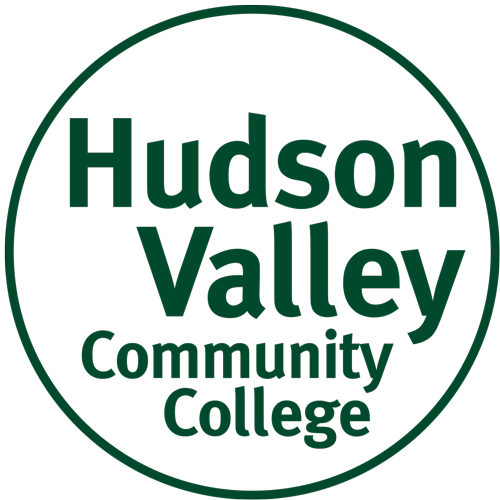
The Importance of a Modern Data Strategy
In the afternoon session, Castles Built on Sand: Why a Modern Data Strategy is Essential to Your Digital Transformation Efforts, Mark Hampton, Executive Education Advisor, AWS, provided an overview of why a modern data strategy is essential to true digital transformation in higher education, and how institutions can best adopt and implement a modern data strategy. Attendees learned what a modern data strategy is, why it is needed, and how to initiate the development of a modern data strategy. In addition, Hampton shared how to use a modernized data platform to yield insights that improve outcomes and reduce inefficiencies, including insights from AI/ML and generative AI.
Leveraging Technology Leaders
With the emergence of digital transformation, increased cybersecurity threats, and the need for effective change management, the responsibilities of technology leaders have expanded considerably. To provide insight into this recent trend, Lizbeth Johnson, Director of Information and Instructional Technology, Penn State Lehigh Valley, led the presentation, Leverage your Technology Leaders as a Strategic Partner. The discussion explored how organizations that recognize and leverage the full potential of their technology leaders are better positioned to thrive in the dynamic and rapidly evolving digital landscape.
Data Science, AI, and Student Completion Rates
EdgeCon’s presentations wrapped with the inspiring panel discussion, Data Science, AI, and Student Completion Rates: A Transformative Partnership at John Jay College, which highlighted the success story of a groundbreaking collaboration between DataKind and City University of New York’s John Jay College of Criminal Justice. Panelists, Dean Dara Byrne, Ph.D., Macaulay Honors College, City University of New York; Dana Prieto, Program Manager, CUSP, John Jay College, City University of New York; and Larry Kilroy, VP, Technology, DataKind, shared how John Jay reported a change in senior graduation rates from 54% to a whopping 86% in just two years.
Moderated by John Harnisher, Ph.D., Director of Education Initiatives, DataKind, the discussion included an exploration of the case study at John Jay, highlighting the impact of collaborative partnerships, the transformative potential of data science and AI, and the irreplaceable role of institutional strategy and keeping humans in the loop. The goal was to provide useful insights that attendees could use to reshape their institution’s approach to leveraging AI for student success and learn how collaborative efforts can foster a culture of belonging and achievement.
Bringing Together Technology and Educational Thought Leaders
As a premier event for networking, education, and exploration, EdgeCon Winter aimed to connect members with cutting edge experts, solution providers, and fellow peers who share in their digital transformation journeys. Attendee P. Clay from Hudson Valley Community College said, “This was a good and convenient full-day event.” Another attendee, A. Laird from Stockton University added, “I truly enjoyed this event. It was very informative and full of learning opportunities while remaining friendly and intimate. The topics, speakers, food, and reception spaces were great. I will definitely be returning in the future.”
Thank you, Edge Member Community, for making this recent event such a massive success!
EdgeCon Winter 2024 Agenda
8:00-8:30 am — Check-In & Networking
8:30-9:30 am — Breakfast, Networking, & Exhibitor Connections
9:40-10:20 am — Breakout Sessions
10:30-11:10 am — Breakout Sessions
11:20 am-12:00 pm— Breakout Sessions
12:00-1:00 pm — Lunch, Networking, & Exhibitor Connections
1:05-1:45 pm — Breakout Sessions
1:50-2:30 pm — Breakout Sessions
2:40-3:40 pm — General Session: Panel Discussion
3:30-4:30 pm — Snacks/Coffee, Networking, & Exhibitor Connections
General Session—Panel Discussion
Data Science, AI, and Student Completion Rates: A Transformative Partnership at John Jay College
Join us for an inspiring panel discussion highlighting the success story of a groundbreaking collaboration between DataKind and City University of New York’s John Jay College of Criminal Justice. John Jay reported a change in senior graduation rates from 54% to a whopping 86% in just two years. This partnership, supported by Google.org, connected the power of an AI-driven tool with the talents of advisors to provide unique insights into students, and the ability to intervene on concerns before they became critical. Our panelists will explore the case study at John Jay, highlighting the impact of collaborative partnerships, the transformative potential of data science and AI, and the irreplaceable role of institutional strategy and keeping humans in the loop. Discover insights that could reshape your institution’s approach to leveraging AI for student success, and learn how collaborative efforts can foster a culture of belonging and achievement.
Panelists:
Dean Dara Byrne, Ph.D., Macaulay Honors College, City University of New York
Dana Prieto, Program Manager, CUSP, John Jay College, City University of New York
John Harnisher, Ph.D., Director of Education Initiatives, DataKind
Larry Kilroy, VP, Technology, DataKind




